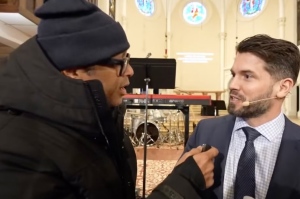My Christian experience with secularism and its 'holy grail'

A cultural misunderstanding of the Christian faith is that it’s boring. Secularism excites by emphasizing reason, science, and free thought, that is, free from any theistic influences. Humanity’s experience of reality is described and explained with inspiration for the unnecessariness of God. Culture finds this fascinating and establishes trends that are unnerving even for devout Christians. Thus an intellectually rigorous discernment of secularism is necessary for continued confidence in “the knowledge of the truth” (1 Tim. 2:4). Believers require a fresh realization that the Christian faith does provide existential and intellectual fulfillment, and makes reality intelligible. Secularism should be criticized for its self-entitled interpretations of reality, and its dubious propositions for humanity.
Alluding to the saying of the late Carl Sagan, it’s often said among the intelligentsia that, “extraordinary claims require extraordinary evidence.” Quoting a pithy saying of famous scientists, however, is not interchangeable with well-documented knowledge. “Extraordinary evidence” has become a game for the secular narrative, as it’s applied unilaterally to the Christian faith. God created the universe ex nihilo, and the resurrection of Christ, are beliefs framed as unsatisfiable outside of Scripture. The beliefs may be true, but the secular mind requires them to be placed under a microscope and confirmatory data to emerge. That’s how unreasonable secular thought is becoming in its demands on the Christian faith. Secular beliefs are not questioned so rigorously. They are accepted gratuitously and by trust in authority figures.
For example, everyone acknowledges that the natural world appears designed. Yet secularism adamantly refuses to acknowledge that the specified complexity and fine-tuning confirmed by microscopic and telescopic observations are suggesting actual design. Such acknowledgment would be a game changer, and so it’s mortally contested by secularism. Secular thought is scaffolded on the belief that the world is assembled on its own by natural laws, and evolutionary theory is the “holy grail.”
In Enlightenment Now, Steven Pinker seeks to refresh humanity by appreciating the ideas of The Enlightenment for today, and onward for a brighter future. Pinker writes, “I will first lay out a framework for understanding the human condition informed by modern science – who we are, where we came from, what our challenges are, and how we can meet them.”1 Pinker’s questions are paramount and the answers affect subsequent claims. His task is noble, but much is self-entitled by a selective interpretation of “modern science.” Some readers are grimacing now, believing that it’s not such a big deal. After all, it’s the ideas that count. Critical thought, however, should not allow special pleas, especially when a worldview makes “extraordinary claims” in answering Pinker’s foregoing questions.
Modern science has observed specified complexity but mainstream science has not explained how it is assembled naturally. Yet secular culture carries on as if it were scientific truth. Thankfully, some scientists have the courage to speak up. Michael Behe says outrightly:
No papers are to be found that discuss detailed models for intermediates in the development of complex biomolecular structures in the Proceedings of the National Academy of Science, Nature, Science, the Journal of Molecular Biology or, to my knowledge, any science journal whatsoever. . . . If a theory claims to be able to explain some phenomenon but does not generate even an attempt at an explanation, then it should be banished. Despite comparing sequences, molecular evolution has never addressed the question of how complex structures came to be.2
Secular thinkers respond with a stack of published material as proof for a natural explanation of specified complexity, but like Behe, I have yet to read anything that explains “how complex structures came to be.” Regardless, the evolutionary theory remains non-negotiable for secular thought.
Dissent is frowned upon. It’s often met with histrionics and ridicule, which can be intimidating. A highly respected contemporary philosopher, an open-minded atheist, has described it as “browbeating.” Thomas Nagel wrote:
It is prima facie highly improbable that life as we know it is the result of a sequence of physical accidents together with the mechanism of natural selection. . . . I realize that such doubts will strike many people as outrageous, but that is because almost everyone in our secular culture has been browbeaten. . . . It is an assumption governing the scientific project rather than a well-confirmed scientific hypothesis. . . . And if physical science . . . leaves us necessarily in the dark about consciousness, that shows that it cannot provide the basic form of intelligibility for this world.3
It is an assumption governing the scientific project rather than a well-confirmed scientific hypothesis. Consequently, Nagel suggests fairly that “it cannot provide the basic form of intelligibility for this world.” So why doesn’t secular thought negotiate its views? Educated people and professors have confessed to me privately that evolutionary theory doesn’t make sense. They nevertheless do not see any harm in going along with it and have advised me to do likewise so as not to appear anti-science. Isn’t that tantamount to checking our brains at the door? Aren’t we to exercise critical thinking? Isn’t science supposed to go wherever the evidence leads? Nagel is correct that “almost everyone in our secular culture has been browbeaten,” Christians too.
When engaging with secular thought, we should not accept gratuitously the intellectual hocus-pocus that interprets scientific data with the aid of artistic illustrations. Explanations should be based on experiments, clear sequencing, falsification, and intelligible demonstrations. Beware that questioning may encounter voice raising, condescension, name-calling, and a “browbeating.” The exquisite designs everyone observes are not merely apparent. They are actual and “irreducibly complex,” a nettlesome phenomenon for the secular agenda.
We were intended and purposed to be in relationship with our Maker. A genuine encounter with God’s grace is the beginning of an exciting journey. For those who believe the cultural trend that the Christian faith is boring, I invite them to taste “the Bread of Life.” I would encourage them to experience God’s Logos as the source of humanity’s consciousness and ability to reason. Let’s not allow culture to rest conveniently in the assumptions and dogmas of secularism. People should be encouraged to exercise independent thinking and decide for themselves. They may discover how powerfully real are the words of Christ, “You must be born again” (John 3:7). As was penned in that great hymn that remains relevant, “Amazing Grace, how sweet the sound . . . I was once blind but now I see.”
1 Enlightenment Now: The Case for Reason, Science, Humanism, and Progress (Penguin Books: New York, 2019), 5-6.
2 A Mousetrap for Darwin (Discovery Institute Press: Seattle, 2020), 30-31. Italics on how are mine.
3 Mind & Cosmos: Why the Material Neo-Darwinian Conception of Nature Is Almost Certainly False (Oxford University Press: New York, 2012), 6, 7, 11, 53.
Marlon De Blasio was born and raised in Toronto. Years ago, he was walking downtown when he received a tract. The caption read, Have You Been Born Again? The Lord Jesus changed his life. He also had a career at a major corporation, and voluntarily moved on to the ministry of the Gospel. His interests are communicating the Christian world-view for our contemporary context, ministry of the Word, Christian leadership, cultural apologetics, and to "comprehend with all the saints what is the breadth and length and height and depth, and to know the love of Christ that surpasses knowledge" (Eph. 3:18). He authored a book titled Discerning Culture. Follow him on Twitter MarlonDeBlasio@Twitter



























